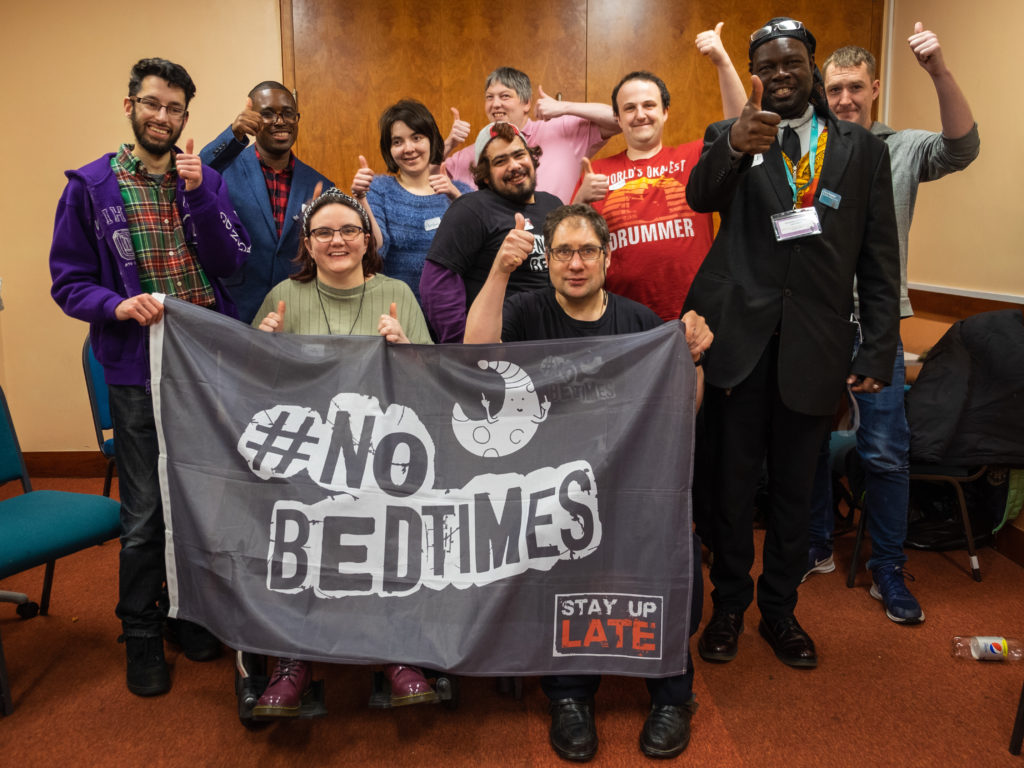
Commissioning social care: what local authorities are telling us
Commissioning social care for adults with learning disabilities: what local authorities are telling us
A report by Stay Up Late – October 2021
“When we go out to gigs we want to stay for the whole thing, not leave when the carer says it’s time to go.” Daniel Randall-Nason – Stay Up Late Ambassador
Back in May 2021 we contacted every local authority in England and Wales responsible for commissioning social care. This was always intended as a key plank of our #NoBedtimes campaign which we officially launched back in November 2019. We had originally planned to write to local authorities in 2020 but Covid came along and we took the decision to delay our lobbying and information-gathering exercise while Adult Social Care teams across the country grappled with the complexities of the global pandemic.
Coming back to the exercise a year later than planned, we wrote to each Director of Adult Social Care and asked them to do the following:
- Talk to your commissioning teams and change all contracts so they have a clear expectation that rotas will be flexible to allow people to stay out late.
- Tell us if you already do this anyway
- If you can’t do this please tell us why so we can understand better what the problems are
We also emphasised the importance of our lobbying campaign with an open letter in the Guardian, signed by many of our Stay Up Late Ambassadors, which received an avalanche of support on social media.

So far, twenty-one local authorities have responded to our request.
Embedding flexible support provision in the commissioning process
A number of local authorities expressed support for our campaign objectives and told us about the changes they had already made to ensure flexible support provision is embedded in their commissioning process and the contracts they sign.
Blackpool Council told us their contract specification is, “based around the principles of person centred care” and that, “in line with the service user’s specification, service users’ preferences regarding their bed times will be accommodated and staffing availability will be designed to support them.”
The London Borough of Merton got back to us along similar lines saying that a new service specification had been put in place which,“does include a specific expectation that individuals should be supported to take part in a range of meaningful activities during the day and evening and that they should have an opportunity to have an active social life.”
Northumberland County Council, meanwhile, told us that,“our adult in-house provider services work in a personalised way, and rotas and shifts are flexible to meet the changing needs and wishes of service users in residential and independent living settings.”
Overcoming challenges
Some local authorities acknowledged that there remained some key challenges to overcome with more work to be done. These are some of the responses we had:
One local authority told us they were “absolutely committed” to improvement and were looking at how they might achieve the aims of our #NoBedtimes campaign: “We can see that it is not without its challenges in domiciliary care but that shouldn’t stop us exploring it.”
Another recognised that they are on a journey, saying they are, “keen to explore how greater flexibility can be built into care contracts to lead an independent and more fulfilling social life.” Their current contracts come to an end this year and while they are looking towards a temporary two-year extension this could provide them with, “an opportunity to modify the contracts to include specific reference to flexible bedtimes.”
Another also acknowledged that there was work to be done: “I have asked my commissioning colleagues about our contracts and I can see that we have some ground to make up. My colleagues are also going to speak with customers directly to check out what’s going on.”
Whilst another, meanwhile, told us that they acknowledge, “the potential issues that you have highlighted and will raise with commissioning team/lead commissioner, plus consider an audit/spot checks.”
A further local authority told us that while they have already embedded flexible support in their service specifications: “We will also test this commitment through the tender and interview process.”
Embracing change
Hertfordshire County Council is one local authority that have enthusiastically embraced change. They have engaged with us in the past, long supported our campaign and commissioned research specifically around the issue of bedtimes:
“These pieces of work have driven our commitment to making services supporting people to have meaningful, aspirational and sometimes ‘messy’ lives like the rest of us a reality within social care. To try and make this a reality, the Council has introduced a supported living framework where support is individually commissioned for people, as opposed to having set ‘core hours’ in services where support levels are agreed in advance. Core hours have been replaced by an element of shared hours for people who need to have support available to them all the time, and individual hours for people to meet their jointly agreed support plan.
The Council has a programme to review historical supported living commissioning, this work is removing arrangements that may reduce the individual support available to people, either because this was easier to commission or easier for the provider to provide the service. Some reviews found that staffing hours were being used at times where people were doing other things, so these ‘core’ support hours were reduced and then re-commissioned as individual hours the person can use at times that suit them. Where shared hours are needed for people living together, these have been extended so there is support available later at night.”
Hampshire County Council is another local authority that has shown a real commitment to changing the way contracts and payments work in order to meet the needs of the people they support, including implementing a new payments system:
“Since 2015 all of our support contracts have included the requirement to have flexible shifts and approaches to support plans. This is intended ensure that people with a learning disability have choice and flexibility in how they live their lives, including when they go to bed. A challenge to this in practice has been the way in which support plans and payments are set up with those providing support, usually these are calculated on a weekly basis which means that rotas can lack flexibility. We recognise this and want to end it. Hampshire are in the process of implementing a new payment system for support which will allow flexibility of delivery over a four week period. This new system will further support people with learning disabilities to access support when they want it. This means that someone with a learning disability could work with their support provider to access support at different times each week to attend gigs or other social events of their choosing.”
Another local authority we heard from are perhaps less further down the line than Hampshire or Hertfordshire but we were hugely impressed by the way they responded to our request. Prompted by our letter, senior officers at the authority began to think about how they might achieve the objectives of our #NoBedtimes campaign for the support they commission. In a thoughtful and creative email exchange that resulted in response to our letter the following came up as a possible action plan. We think there is a lot from this that many local authorities could take on board:
- Define ‘no bedtimes for adults’ as an outcome for all our supported living providers – that means it goes into our Supported Living tender documents and new contracts.
- Ensure our provider quarterly monitoring looks asks for evidence on this, including what they have supported people to do and how the staffing is achieving this. (Matching staff with similar interests, shifts that flex to the person’s schedule, not the service).
- We need to know from the people being supported what they think is working well, what isn’t and what they would like to change, we need their voice not just that of providers. We are hoping the LD ambassadors will help us with this ‘checking’.
- Do some awareness raising work with parent/carers because there is sometimes a conflict between what adults want to do (have fun, party, relationships etc.) and what their parent/carers want for them (safe and protected).
- Make sure social workers, practitioners and providers are ensuring that person-centred plans reflect the ‘nightlife’ aspirations and the support to develop confidence, awareness and connections, and that night time activities and engagement is seen as important as daytime activities.
Next steps
There is clearly much to learn but it is also evident that there are clear examples of good practice out there and also that there are other local authorities who are keen to learn from these.
As Nottinghamshire County Council put it: “We would certainly be interested in any models of good practice you know of that can help us when tackling issues such as contracts and driving innovation within the sector.”
With this is mind we plan to host an online seminar later this year where we will be inviting a number of local authorities to share their own learning, as well as, importantly, hearing from some of our own ambassadors with a learning disability and what they want in terms of flexible support.
by Darren Johnson
Campaigns Co-ordinator – Stay Up Late
Further information
For more information on our #NoBedtimes campaign visit our campaign page here
Download a pdf of this report: Commissioning social care report
Email us at: info@stayuplate.org
Help us by donating
Our community need you! Help more more adults with a learning disability get out and have fun. And help learning disabled people have their voices heard. All donations make a huge difference. Thanks a million for your support from The Stay Up Late community. Donate here



